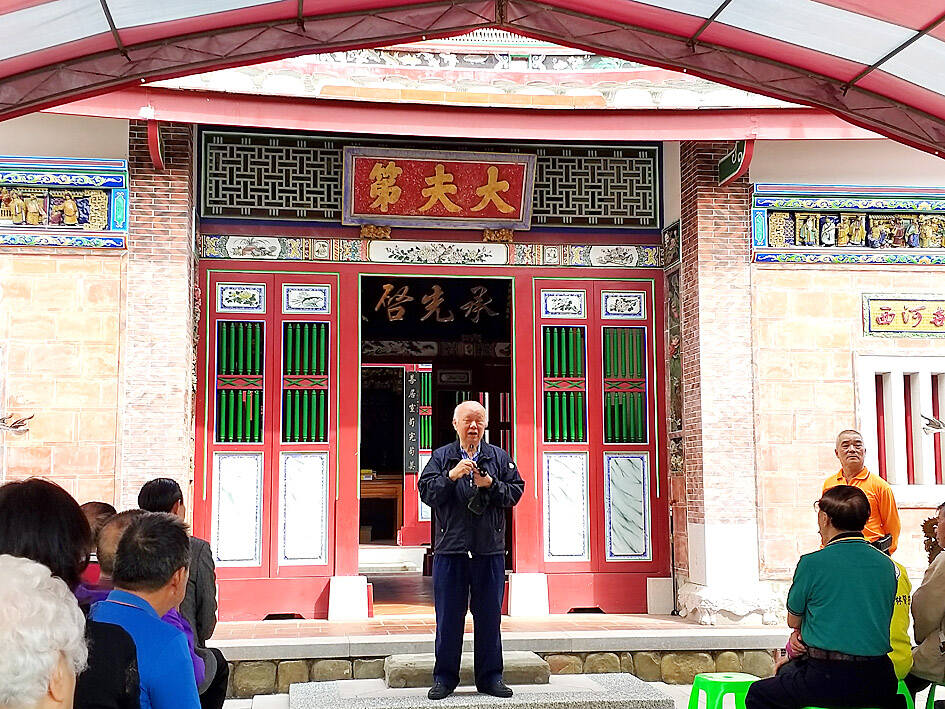The Constitutional Court yesterday heard oral arguments in a gender equality challenge to the Ancestor Worship Guild Act (祭祀公業條例), which bars married women from becoming successors in some guilds.
An ancestor worship guild is a familial organization established to govern the affairs and assets utilized for worship. Successors are members who inherited their positions from its initiators, says the act, which was promulgated in 2008.
Article 4 of the act says that if a guild established before the law was promulgated does not have membership rules, successors should be designated among the men of the family’s patrilineal lineage, the family’s unmarried women or husbands matrilocally married into the family.

Photo: Liao Hseuh-ju, Taipei Times
A woman can become a successor only if two-thirds of current successors or the entire body agrees, the article says.
The lawsuit was filed by the descendants of Chen Ao (陳奧), a married woman who in 2014 was posthumously excluded from the successor list of the Ancestor Worship Guild of Lee Lu (李祿).
Chen’s descendants say the article breaches the principles of equal treatment before the law, freedom of assembly and association, and right to property as outlined in the Constitution.
The plaintiffs said the law also contravenes Article 22 of the Constitution, which states: “All other freedoms and rights of the people that are not detrimental to social order or public welfare shall be guaranteed under the Constitution.”
The article being contested could be traced to the principle of male privilege that had been enshrined in ancient Han Chinese law, National Taiwan University professor of law Wang Tay-sheng (王泰升) told the court.
Although jurors have upheld the patrilineal succession of such guilds from the Japanese colonial period, the legal principle is not compatible with modern understandings of gender equality, Wang said.
The legislative history of the act clearly shows that the government disregarded constitutional protections for gender equality and transformed the discrimination of women from custom into law, National Taipei University law professor Kuan Hsiao-wei (官曉薇) said.
Women are excluded because they do not take part in the rites, not because of their gender, which means there is no discrimination, attorneys for the Ministry of the Interior said.
As guild assets are publicly owned, exclusion from management of a guild’s holdings cannot be said to constitute a deprivation of property rights, they said.
A ruling against the constitutionality of the act would result in the inclusion of successors into guilds in which they play no real role and difficulty in conducting ancestral rites, in addition to creating separate legal systems for guilds created before and after 2008, they said.
Striking out the successorship article would be a breach of customary law, as Taiwanese society deems married women to be members of their husband’s family for purposes of ancestral rites, they said, citing a ministry study on Taiwanese customs.
Changing the law would affect 3,555 certified guilds while imposing an unreasonable expectation that they must vet newly qualified successors with fragments of genealogy, they said.
The potential for controversy and litigation might result in administrative chaos for the ministry, compromise legal certainty and go against people’s convictions about ancestor worship, the lawyers said.

Three passengers and the assailant were reportedly injured in a knife attack on the Taichung MRT on Tuesday. The Rapid Transit Brigade of the Taichung Police Department is still investigating the incident, with no motive immediately apparent. Taichung Police Commissioner Lee Wen-chang (李文章) said that at least four people were injured in the attack, and the suspect has been taken into custody. The incident occurred at about 11:15am on a train car near Taichung City Hall Station. Witnesses reported seeing a man attacking others with a knife, while other passengers tried to grab his hair or fend him off with umbrellas. Three people were reportedly

‘OBNOXIOUS MAN’: The KMT’s Chen Ching-hui moved into Chung Chia-pin’s path atop the podium and reached for him before he grabbed at her legs with both hands Democratic Progressive Party Legislator Chung Chia-pin (鍾佳濱) yesterday said he slipped and lost his balance, and did not know who was around him, after jumping onto the speaker’s podium at the legislature in Taipei. He apologized after a collision with Chinese Nationalist Party (KMT) Legislator Chen Ching-hui (陳菁徽), who moved to intercept him as he mounted the podium. There was pushing and shoving when the session started in the morning as KMT lawmakers attempted to block access to the podium to shield Legislative Speaker Han Kuo-yu (韓國瑜) so he could preside over the session. Video footage showed Chung step on a chair and

Schools in Keelung and four New Taipei City districts are to be closed to the public until Wednesday, as police continue searching for an escaped patient convicted of attempted murder. The New Taipei City Government on Tuesday decided to close campuses in Wanli (萬里), Sijhih (汐止), Pingsi (平溪) and Rueifang (瑞芳) districts to outsiders, as the patient was last spotted taking a bus toward Rueifang from Keelung. Police patrols have been increased near schools, the city government said, advising students to travel in groups and not linger near campus. The Keelung City Government earlier announced that campuses and local representative offices in the

Taipei police on Saturday arrested 24 female Thai tourists on suspicion of working as hostesses and engaging in illegal activities at an underground bar in Zhongshan District (中山), the distict’s police precinct said in a statement yesterday. The police also arrested five other people involved in the operation, including the 29-year-old bar owner surnamed Chiang (蔣), and 17 customers, the statement said. The 24 Thai women were fined an undisclosed amount in accordance with the Social Order Maintenance Act (社會秩序維護法) by the police and transferred to a National Immigration Agency (NIA) special brigade in Taipei for repatriation to Thailand. The cases of